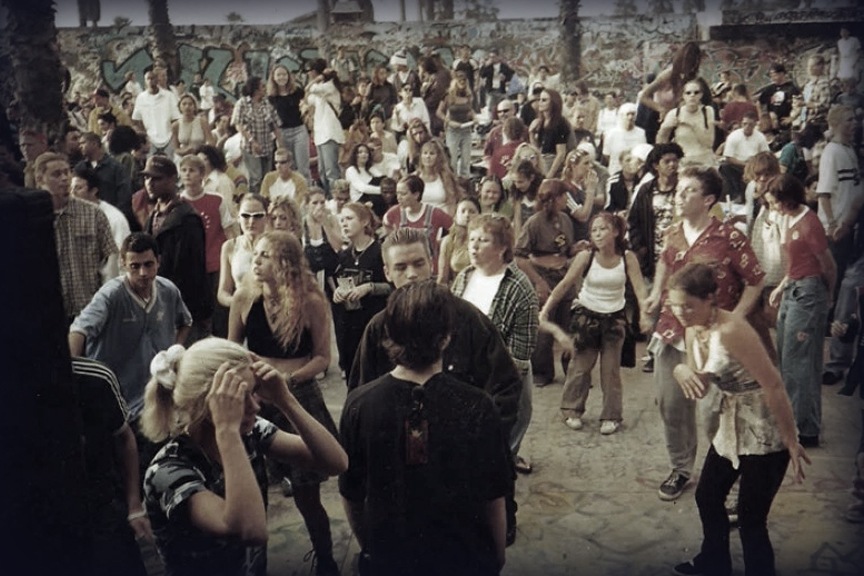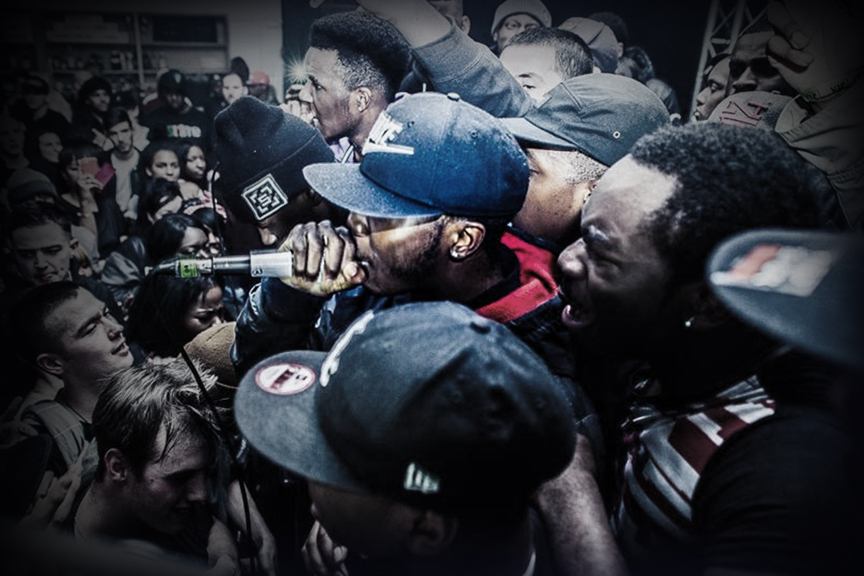Youth culture and underground music have always found themselves running hand in hand; typically from ravenous-dog-wielding police. Though most are seemingly unaware of the movements that surround them, Britain’s youth of today have made up their minds on an important question – one that for some time looked like we may never see an answer. The question is of which underground genre could become the generation’s political force: which genre would have the guts, the passion and the mass support to actually attempt to make a difference in this day and age.
The late 70s early 80s, of course, had punk; the genre and subculture pioneered by its ideologies of non-conformity and opposition to selling out. We have the punks to thank for the original independent record labels and fanzines which would one day become a crucial insight when analysing the politics of the time. Punk culture took on mainstream head to head, successfully dousing fear into the hearts of its biggest oppressor, the government.

Contrary to what the media depicts, punk wasn’t born from teenage angst, not from the petty fury felt when your parents won’t let you dye your hair, no. Punk subculture arose in the mid-1970s while England burned with working class fury. The neglect of those below the poverty line combined with their daily struggle to survive sparked the chain reaction that developed into a culture of young adults who didn’t want to grow up to live in the same world as their greying parents. This was a culture where anti-establishment was everything; their opposition to ‘selling out’ meant the punks rejected anything that had been constructed to manipulate or influence them, i.e. the mainstream media.
Going forward, the 90s was where England’s rave scene boomed – in the most literal sense. To a soundtrack of trance and acid house, a generation of teenagers made history forever as they realised their power in numbers and partied amidst un-relenting police warnings. This was a crowd who, unlike the punks, saw each other as family, as a union, and as peaceful. Throughout the decade, massive free parties and festivals were organised, one of the most infamous being the Castlemorton Common festival which was held in Worstershire in 1992 and raged for an entire week while police looked on helplessly. The government felt so intimidated by this culture that they went to the extent of creating a new law in order to overpower its teen followers. This was a law that specifically enabled police to shut down any event featuring music with a ‘succession of repetitive beats’. It was probably the sheer scale of these events (organised pre-internet and pre-mobile phone) that terrified those in power. Did they really have the power if a collective of music-minded teens could organise such a successful hoard? The law, created in 1994, was undisputedly a warning to Britain’s youth to back down. Eventually, they did.

It’s 2016 and we appear to have become a little more docile. Maybe it’s the alleged fluoride in our water systems, or various alienating laws impended upon us, but up until a year ago it was looking as if the ‘good-for-nothing’ youts of the millennia were going to remain just that. I’d just about given up my hopes of a drum and bass uprising, some tiny part of still me rooting for the genre to be the one to lead us into a revolution; with its family-like community echoing the ethics of that of the 90s, and its soul-piercing basslines obnoxious enough to piss off anyone within a 5-mile radius. Sadly, it became too hard to imagine a capitalist character like Andy C hitting the pause button mid-set and commanding us to “fuck the police”. A victim to the mainstream, would he dare to rock the boat in such a way?
In this modern world with its culture of smile-and-wave celebrities, no real political drive or no care to express one, to what extent has the youth culture of today become blind to the oppressions of mainstream culture and what it means to be a part of it? For today’s youth to actually believe that the meticulously constructed products of the mainstream have some level of authenticity, perhaps to consider that it was Beyoncé alone behind her recent painfully publicised coming-out-as-black movement, is to believe in something that goes against their own best interests. Compared to the likes of grime’s Skepta and Jme, Beyonce and her music are about as real as the concept of an actual democratic world.

England’s time spent under conservative ruling has revealed certain struggles within the society, but only to those willing to look further than mainstream publications for news. We’ve all but forgotten the wide-spread riots of 2011, ignited by Mark Duggan’s unjust death at the hands of the metropolitan police, which occurred after a series of prejudiced attacks from the police on the Afro-Caribbean community in Tottenham and surrounding areas. Though the public inquest ended with the verdict that the killing was to be considered lawful, it was widely believed by members of the public that police misconduct had taken place, and that this was far from the first time the state had escaped punishment-free. The country-wide riots (spanning London, Manchester, Liverpool, Bristol and Birmingham) raged for two days before being ultimately defeated by the brute force of riot-control officers. The media reported the outrage as youths on a rampage, intending to steal and cause harm, when reality of it was that the public had lost faith in the system. A year later, while Nicki Minaj represented her culture by announcing that Starships were in fact meant to fly, Eyez rapped in ‘#SPITFIRE’: “I don’t give a fuck about a black president / Cos’ I ain’t had help from Barack Obama”. With bars that originate from the minds of those most affected by the oppressions and prejudices of our time, grime is one of the few genres of today with enough freedom to address the realities of our social structure head on. Skepta raps in his 2016 offering Konnichiwa: “Tell the President we ain’t forgot / Tell the Prime Minister we still remember / Man don’t care what colour or gender / Nobody’s votin’ for your corrupted agenda”
[youtube https://www.youtube.com/watch?v=Pa4n_8EK3ig]
Typically not tied down to labels and so able to speak their minds, today’s grime artists are pretty much the only hope Britain’s youth has for making a difference via musical involvement. Endorsing Justin Bieber’s new album may be more up your street; but would it be if the only thing up your street were the derelict remains of a functioning society that once was?
Skepta and his counter-parts not only see the injustice, but grew up in it and felt the pain of it first-hand. Now, they rap about it. It’s easy for the new age rebellion-igniting lyrics to be lost amongst “ring ring pussy”-ies and so perhaps the artists themselves that need to create material more accessible to a wider audience to avoid alienating potential supporters and emphasise their political agenda.
The UK grime scene is something that is demanding to be taken more seriously. It is for that reason, that potential cause for dispute between civilian and those who oppress us, that we must utilise this genre and support it in the way that it should be supported: as a political force. Grime is the voice of a generation who aren’t allowed to speak. It is an outlet and a defence against all that represents the establishment, all that the youth have no control over, and all that has – up until now – had control over them. The media mocks millennials; Lazy, entitled and politically indifferent. But now, with grime’s politically involved artists, its potential to instil fear in the hearts of the 1% who make our decisions for us, and its support from the youth culture it created, who are (albeit nike-snapback-donning) more powerful than they realise, the millennial youth have been given something that no amount of laws or police brutality can take from them. They have been given hope.
Less drug-tinted than the drum and bass scene and more politically motivated than techno or garage will ever be, grime has been selected by Britain’s youth as its weapon of choice. If they, as a generation, realise that they’re on to something by supporting these government-bashing, independent-record-making pioneers, then maybe they can stop forming mosh pits and start making a difference.
[x_share title=”Share this Post” facebook=”true” twitter=”true” google_plus=”true” email=”true”][author title=”About the Author”][recent_posts count=”4″]





